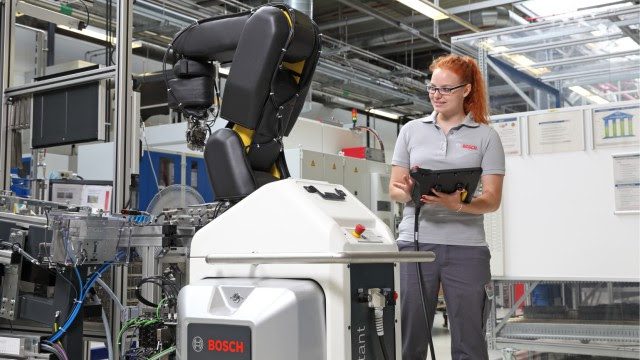Bosch has opened two new Industry 4.0 academy venues in Germany, and is offering Industry 4.0 apprenticeships and qualifications to staff at 240 Bosch plants worldwide, as well as to employees at partner organisations, via an international network of chambers of industry and commerce.
The German outfit is offering the new Industry 4.0 training regime as part of the regular 2021/22 academic calendar, starting this month (September). It has opened new smart manufacturing training academies at its factory in Stuttgart-Feuerbach, where it has put-live a private 5G network with Nokia, and at the new Bosch Rexroth innovation centre in Ulm, in the southern German state of Baden-Württemberg.
The Ulm site, announced in April, is slated to “work on progressive approaches and business ideas” and to bring 5G-capable products to market, for use in its customers’ factories, as well as its own. It followed another new innovation centre in Renningen, opened last year as the first in a run of investments to help the firm deliver €1 billion incremental revenue per year by 2022 from using and selling its own Industry 4.0 solutions.
Bosch said its new Industry 4.0 ‘apprenticeship and professional development’ qualification, which it helped to design, is based on the original German Industrie 4.0 model, and covers 100-odd different courses, available via online seminars and on-site training. It said training will cover robot programming, augmented reality, app technology, RFID, and manufacturing execution systems, among other specialist programmes.
New courses, including to qualify as ‘industrial manager of digital transformation’, start this month in pilot phase, and will be exported internationally in due course. A statement said: “Thanks to German chambers of commerce outside Germany, this ‘homegrown’ Industry 4.0 curriculum is now becoming the international standard as well. From Slovenia and the Czech Republic to Malaysia [and] Singapore… companies are training their workers according to the German model.”
Bosch has also developed a range of training equipment, like “Industry 4.0 mini-factories”, which will be available for vocational schools and universities, as well as its own training centres. The company is developing a series of factory ‘profiles’ to train its own staff in specific digital-factory disciplines to cover the gamut of Industry 4.0 at each site. It described a “permanent Industry 4.0 team consisting of a coordinator plus IT specialists for infrastructure, hardware, and processes… rounded off by data analysts and data scientists.”.
Rolf Najork, member of the board of management at Bosch, said: “Because Industry 4.0 strengthens the competitiveness of manufacturing sites, it helps safeguard jobs… Skilled workers are the key to Industry 4.0, and vital for competitiveness. Any company wishing to become and stay successful has to train its people.”
Filiz Albrecht, board member and director of industrial relations at Bosch, said: “Our 240 plants worldwide keep us at the cutting edge…Nearly every one of our plants has connected applications in use, and we continue to systematically train our associates for Industry 4.0… We offer the appropriate courses for each new role. After all, you have to understand the connected world before you can shape it.”
Bosch quoted a survey by industry association Bitkom that almost two-thirds of German companies have integrated Industry 4.0 applications into their manufacturing operations, compared with around half of companies three years ago. It said 55 percent of companies lack Industry 4.0 specialists, and 52 percent feel overwhelmed by the complexity of the subject.

